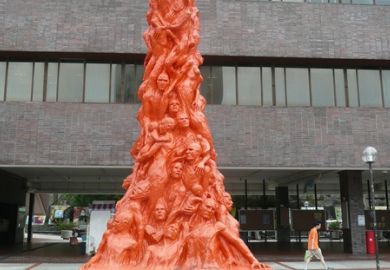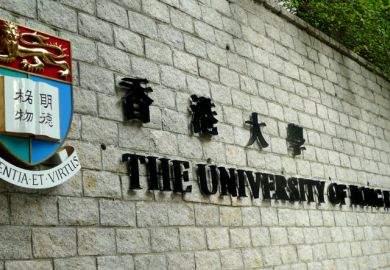As 2021 came to a close, two Hong Kong universities sparked outcry from university students and faculty with the removal of pro-democracy statues.
It was the cherry atop the cake in a year when several of the city’s institutions severed ties with their student unions amid concerns about the compatibility of political activism with a new national security law. Outside academia, the signs are worrying: two independent media outlets have folded in recent weeks, with employees of the website Stand News arrested on suspicion of publishing seditious materials.
As 2022 gets under way, are there still ways in which academics and students in Hong Kong universities can express their views freely, and what tactics do they need to adopt in order to escape political pressure?
For many academics – particularly those in disciplines such as history, law and politics – remaining in their posts means keeping their heads down and avoiding taking political stances on contentious issues or denouncing the Chinese Communist Party.
“It is not that academics in Hong Kong are told what to say or not to say. It is more that the national security law of June 2020, with its ambiguous phrasing, makes Hong Kong academics wary,” said Peter Baehr, a professor in social theory at Lingnan University until August 2021 and now a fellow at the University of Florida’s Center for Social and Political Thought.
Critics say that the law is open to broad interpretation, threatening freedom of speech. It covers crimes of secession, subversion, terrorism and collusion with foreign forces – with a maximum penalty of life imprisonment.
Still, fear of “sedition”, which “hangs over the universities”, hasn’t prevented many academics from forging ahead, said Professor Baehr. “Academics will find oblique ways to discuss controversial issues. But this requires effort and risk, a minority taste,” he said.
Based on numerous accounts from academics based in Hong Kong, this is precisely the approach they are taking.
“Students seem reluctant to engage in potentially politically sensitive topics, but that doesn’t prevent me – and some of my colleagues – from doing so,” said Carsten Holz, professor of economics at the Hong Kong University of Science and Technology and one of the more outspoken commentators on the state of academic freedom at Hong Kong institutions.
But even he is cautious. He noted that with the switch to online teaching during Covid-19, it has become far easier to catch out academics who voice contentious opinions. Although his university provides a recording service so instructors can post lectures online, Professor Holz opts against using it.
“I do not create nor allow any recording of my classes and the same holds for many of my colleagues,” he said, while acknowledging that it was impossible to prevent students from taping lectures without his permission.
Professor Holz said that since the passage of the national security law, academics have been exercising more caution over how they express themselves online. “Most if not all of my colleagues who were active on Twitter or Facebook deleted their accounts around 1 July 2020, or at least deleted selected old posts,” he said.
Numerous academics told Times Higher Education that while they have not felt explicitly pressured by their universities to refrain from speaking their mind on controversial issues, the things that outspoken academics say have a way of catching up with them. It is understood that in several cases, university leaders received calls from those in positions of power to keep their faculty in line.
“It is a known fact that phone calls arrive,” said one academic, adding that this could have consequences for a professor’s salary or sabbatical application.
Academics expressed hope that their administrators would stand up for them when the time came, but many were pessimistic. According to Professor Holz, “the best that university administrators who wish to uphold academic freedom can do is to deflect outside attacks on the academy to the highest degree possible”.
Another Hong Kong-based academic, who wished to remain anonymous, said that academics could talk about issues indirectly: “The best alternative I can think of is to take inspiration from dissidents on the mainland on how to discuss risky issues, or express criticism, in a roundabout way.”
For instance, instructors could discuss authoritarian regimes and repression in classes by focusing on examples like Belarus or North Korea. If academics critiqued China directly, they would do well to focus on particular policies – ideally past ones – rather than express blanket condemnation for the Chinese Communist Party, the academic said.
Faculty can also choose to “provide students with moral support” via discreet conversations and choose not to enforce “oppressive rules”. For example, teachers are expected to report students to university administration if they find students screening a “prohibited” movie, such as Revolution of Our Times – a 2021 documentary on the Hong Kong pro-democracy protests – said the researcher.
Another Hong Kong-based scholar who also preferred to speak confidentially said that researchers were freer to broach controversial topics in their papers than in the classroom.
“There is currently not much scrutiny of what we write about unless we apply for funding or for promotion,” they said, adding that “not caring” about career progression would “help with a sense of autonomy”.
The academic said another means of avoiding unwanted attention could be to refrain from putting sensitive keywords into publication titles, a trick that works since “university reviewers often do not have the time to screen things beyond a title or a short summary”.
Still, by virtue of their fields of study, some scholars may inadvertently run into trouble. While it is difficult to find exact figures on how many have already left, many of the academics THE spoke to knew colleagues who had left or were in the process of leaving.
“Researching and publishing on potentially sensitive Hong Kong or China topics today is hardly possible within Hong Kong any more, and I don’t see what Hong Kong-based faculty can do to avoid the problem, except to leave, which many are doing,” said Professor Holz.
He was pessimistic about future freedom of expression for those who opted to remain in the city.
“I don’t think it is possible for academics to be politically active in Hong Kong any more,” he said. “Nor do I see any scope for student protests going forward.”
But students have been finding ways of remaining politically engaged.
Lah, a student at the Chinese University of Hong Kong who asked to go by his nickname, said that for those who are active in campus politics, the way forward was through more spontaneous, decentralised actions rather than to organise protests as part of a central student union.
He said that this was how students reacted after the Goddess of Democracy statue was removed from his university campus.
“We are kind of formless – the risk is relatively small because we are not organising the events [or] using our own names…we are privately calling friends to participate,” he said.
But not everyone agreed that Hong Kong’s political environment has hampered student rights or affected institutional autonomy.
Ka Ho Mok, vice-president at Lingnan University Hong Kong and a professor of comparative policy, said that he did not “experience significant changes as a researcher and university administrator except we must be sensitive of the captioned law”, adding that “in general, academics and university administrators still enjoy institutional autonomy”.
While Professor Mok acknowledged that a “few” of his colleagues had left the city, he was confident Hong Kong universities would continue to attract top academic talent. He said that faculty who practised sticking to the facts – an approach that has served him well – shouldn’t encounter any issues.
“As a social scientist, especially researching on contemporary Chinese society’s development and policy, I have managed to publish my works based upon empirical evidence [and] conceptualising my research findings,” he said.
Professor Mok took a pragmatic view on the national security law.
“I do not think, as university administrators, we need to censor students if they are not violating laws,” he said. “University students are adults and they must observe the legal implications and consequences. As university teachers, our duty is to engage students to learn to be socially responsible and act properly.”
Gerry Postiglione, emeritus professor of higher education at the University of Hong Kong, expressed dismay at the negative media portrayals of Hong Kong universities. He said that he did not know of any academics who had been censored by their universities for their teaching or research.
Professor Postiglione pointed out that universities were by law autonomous, albeit “subject to constraints of dependence on finance”, and that staff members can “teach and research as they think best”.
He also noted that the West was not immune to its own problems with academic freedom, noting recent instances of censorship at more than one US institution. “There is self-censorship in universities everywhere in the world, even in my country,” he said.
Even academics who said the national security law had significantly affected academic freedom noted that they were freer of “identity politics” than their colleagues in Western institutions.
“What is really needed is public affirmation of the university as a space of free discussion. Then again, this very affirmation is absent now in Western universities, too,” said Professor Baehr.
“In fact, I’d say that a heterodox academic in the US, Canada, Britain and Australia has a harder time of it than one in Hong Kong today…The Chinese Communist Party ranks second in menace to Western woke faculty and administrators.”
POSTSCRIPT:
Print headline: Quiet defiance and ‘discreet’ chats for Hong Kong scholars
Register to continue
Why register?
- Registration is free and only takes a moment
- Once registered, you can read 3 articles a month
- Sign up for our newsletter
Subscribe
Or subscribe for unlimited access to:
- Unlimited access to news, views, insights & reviews
- Digital editions
- Digital access to THE’s university and college rankings analysis
Already registered or a current subscriber?








